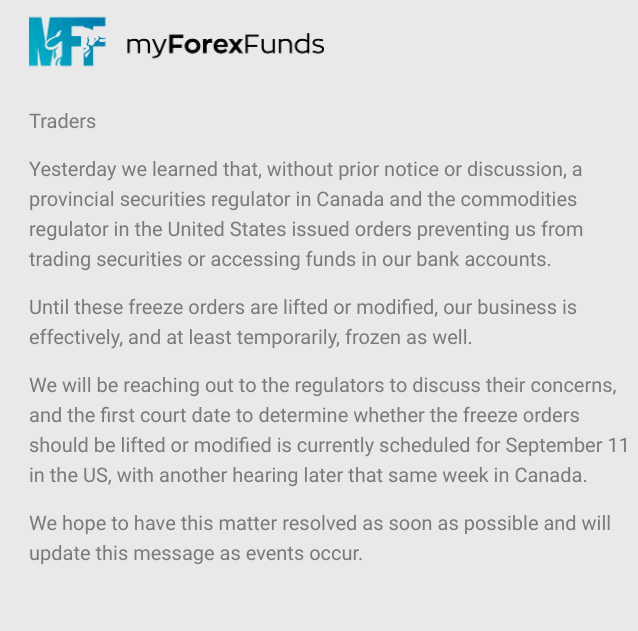On September 1, My Forex Funds shocked the prop trading world by announcing that their assets had been frozen by financial regulators in the US and Canada. This effectively shut down MFF and locked their prop traders out of their accounts, at least for the time being.
MFF initially responded with hopes that a hearing on the matter, scheduled for September 11 in the US and soon thereafter in Canada, would clear them to resume operations.
However, after the Commodities Futures Trading Commission (CFTC) released a full explanation of the charges against MFF, I think it is very unlikely they’ll reopen any time soon, if ever.
An opinion issued by the judge in November spelled out even more bad news for MFF (and for most US-based prop firms).
NOTE: This is a developing story. I’ll update this page with any significant news, and cover MFF extensively in my weekly prop firm newsletter. Subscribe here:

Table of Contents
Why was My Forex Funds shut down?
The CFTC closed MFF’s accounts due to their allegation that MFF was defrauding its clients by actively trying to prevent them from becoming funded traders, while promising the opposite.
While MFF stated that they made money when their traders made money, they actually made far more money by collecting trader sign up fees and then failing those traders during the evaluation stages or making it extremely difficult for them to be successful.
The CFTC alleges that MFF worked against their traders in a number of different ways including charging undisclosed commissions, manipulating market conditions, executing trades at prices different than what their traders saw, and closing accounts for unfounded reasons.
Indeed, MFF was essentially betting against their traders in almost every trade by acting as the counterparty rather than as a liquidity provider.
Furthermore, MFF is accused of unregistered trading in Canada, as well as the illegal distribution of securities. And the CFTC charged MFF with fraudulently soliciting customers to make leveraged forex and commodity trades, “in clear violation of the law,” according to Director of Enforcement Ian McGinley.
My Forex Funds allegedly took in more than $310 million in fees and had more than 135,000 customers since its inception in 2021. Some of that money ended up in the private accounts of CEO Murtuza Kazmi, who spent it on luxury cars and mansions, as one does.
What’s next for My Forex Funds?
First on the docket is the hearing in New Jersey regarding the seizure of MFF’s assets. That hearing takes place on September 11, and will be an opportunity for MFF to directly respond to the allegations. Later that week, Canada’s regulatory agency will have a similar hearing.
These hearings should give us a very good indication as to how strong the governments’ cases are and how seriously federal courts are taking the allegations.
As part of this hearing, MFF is required to turn over their books, which could provide even more evidence for regulators.
I suppose its possible that one or both courts unfreezes the accounts and lets things return to normal, but considering the extent of the allegations, I would think it’s going to be a long road back for MFF.
What happens to clients of My Forex Funds? Will I get my money back?
Hopefully. The CFTC is seeking “restitution to defrauded investors” and “disgorgement of ill-gotten gains.” That means they will try to get former clients’ fees back and take it out of Kazmi’s car and mansion fund if they can. This will, however, probably be a pretty long process.
What does this mean for other prop trading firms?
That’s a hard question to answer so quickly, but at the very least we can say goodbye to the days in which prop firms operated completely off-radar. For the time being only MFF is directly affected, but clearly, at least in North America, regulators have started looking closely at prop trading firms.
The question is, then, which prop trading firms will hold up under this scrutiny?
MFF was one of the few prop trading firms in the US/Canada that acted as their own broker, and indeed a lot of the charges are related to that fact. This would suggest that prop firms that use third-party brokers would be less likely to draw the eyes of regulators.
However, the CFTC also accused MFF of soliciting customers to make leveraged forex trades without being a registered broker/dealer, which could pose a problem for the industry as a whole. Prop trading firms have always operated in a gray, unregulated area in which they claim to be financial education companies or hide under the umbrella of proprietary trading firms who are simply trading their own funds.
If the CFTC begins treating all prop firms as broker/dealers, they will all be subject to far more regulation and the prop trading world will be forever changed.
That’s not to say changed for the worse, necessarily. Some of the charges levied against MFF, such as canceling customer accounts without pretext, or manipulating prices, have also been directed at other prop firms and with good reason. Clearly these practices have to end, so maybe a little more regulation of prop firms would be a good thing.
It is also worth noting that a number of popular, reputable prop trading firms, such as the 5%ers, for example, are based in countries where regulatory interference is far less likely. US regulators would not be able to seize their assets or make them cease operations, although they could possibly prevent Americans from signing up.
There is still a lot of uncertainty surrounding the future of prop firms, but the reputable firms all knew the day of further scrutiny and regulation was coming and have prepared accordingly. For these firms there might be some roadbumps as they navigate a new regulatory landscape, but ultimately their business should remain largely unaffected.
Stay tuned…
Like everyone else, I’m still trying to get my head around this, and more information will come to light in the coming days. I promise I’ll keep you updated!


Proszę o informację w sprawie mff mam tam dwa konta i potrzebuje odzyskać pieniadze
Przykro mi to słyszeć. Wszystkie aktywa WRF zostały zamrożone przez CFTC, dlatego WRF nie mogą obecnie przyznać żadnych zwrotów. WRF walczą z tą sprawą w sądzie, ale prawdopodobnie upłynie dużo czasu, zanim zostanie osiągnięte jakiekolwiek rozstrzygnięcie. — Michael (Using Google Translate)